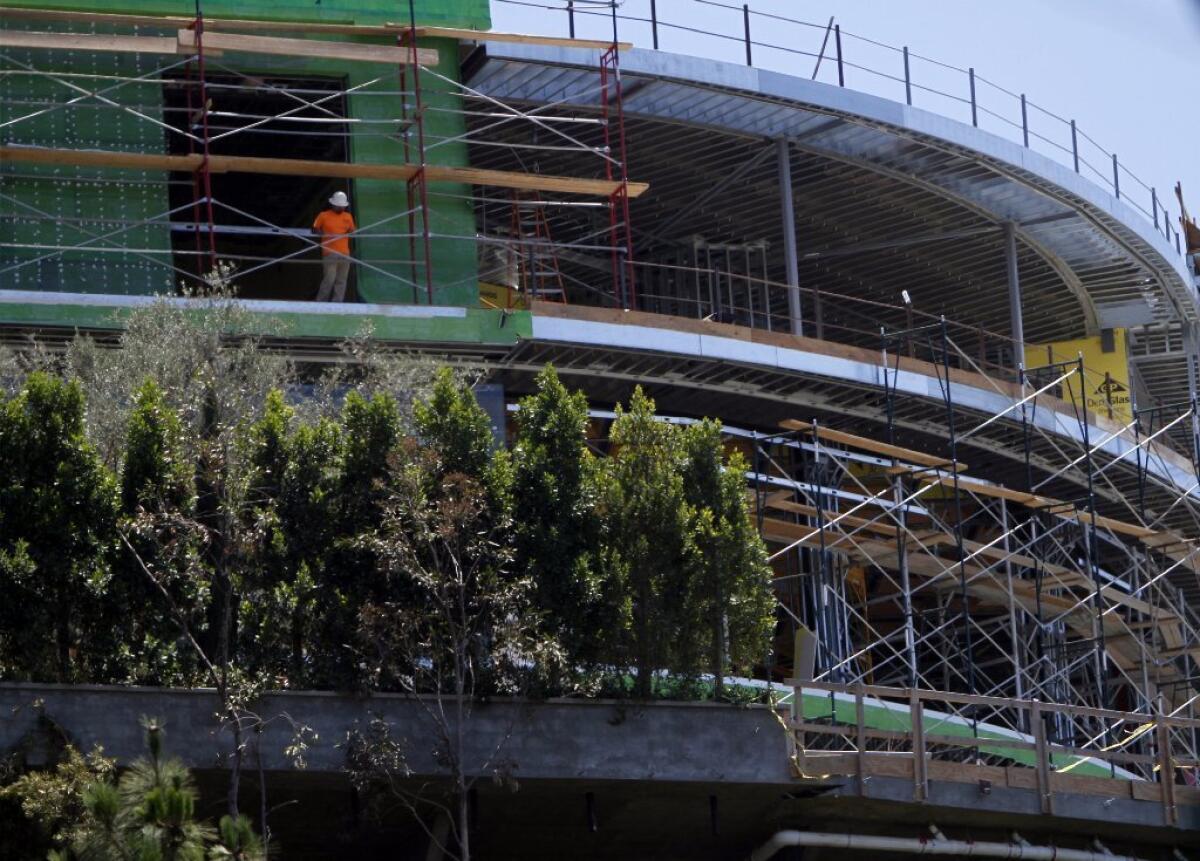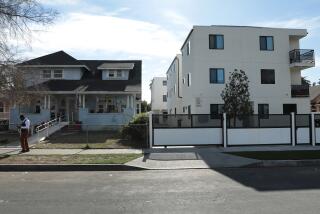Opinion: When City Hall has to fight itself

First, it was something I wrote. Then, it was something I read.
In a recent “Patt Morrison Asks” column, I spoke with George L. Kelling, the co-father of the “broken windows” community policing tactic, the idea that a small problem of neighborhood disorder might snowball into a large one of neighborhood danger and decline if it’s unchecked by police and the community.
And then I read Emily Alpert Reyes’ and David Zahniser’s story about developers promising the city of Los Angeles just about anything to get their projects approved, and then blowing off the promises once they’d gotten a green light.
Alpert Reyes and Zahniser found examples of bad behavior across Los Angeles, very possibly the consequence of what happens when major developers get to operate on the city’s de facto “honor system,” as the city’s condition compliance unit supervisor, Rocky Wiles, described it.
And it’s not just major commercial projects. The worst scofflaw when it came to an individual home may have been Gerhard Becker, whom prosecutors said so persistently flouted building codes in a large house above Sunset Plaza that he should be held criminally responsible for the death of a Los Angeles firefighter during a fire at the house in 2011. As his trial for involuntary manslaughter charges was about to begin last year, Becker pleaded no contest in exchange for a six-month jail sentence.
The takeaway is this: Give some developers an inch, and they’ll take a whole block.
Zev Yaroslavsky, who just retired from the County Board of Supervisors, also served for years on the Los Angeles City Council, and he recalled occasions when developers got zoning overruled. Developers came in, he said, paid “top dollar” for land zoned one way, then asked the city for zoning changes to increase density -- and often got it. Yaroslavsky quoted Gale Goldberg, the former city planning director, saying, “In most cities in America, the value of a piece of property is determined by what the zoning is. In Los Angeles, the value is determined by what the developer thinks the zoning should be.”
My colleague Martha Groves has written about the high-handedness in the high-end real estate and construction undertakings of the Westside. Mohamed Hadid’s massive Bel-Air project, says Councilman Paul Koretz, looks “more like the Getty Center than a home.” After neighbors [one of them a lawyer] complained, the city looked into things and revoked the construction permits. And after a city attorney meeting with the builders last week, it’s still hard to get straight what’s going on.
Deserved or not, and I’m sure the city would argue it is not, L.A. is building a reputation for inconsistent, lallygagging enforcement. And if even a Bel-Air lawyer, who knows how to get heard downtown, is frustrated, imagine about those in less prosperous neighborhoods who understandably if naively expect the city to enforce its own rules, and feel helpless and angry when it doesn’t.
Which brings us back to Kelling and “broken windows.” I think it’s time for some “broken windows” in the city’s planning, zoning and building departments. Instead of turning a blind eye, or even approving major building transgressions after the fact, turn a laser eye to residential and commercial projects. Get Rocky Wiles some help. Don’t leave it to neighbors to fight City Hall. Expect the city to follow its own rules.
The city counters that its enforcement bench is too thin, and there’s no money to bulk it up. But as Kelling argues, unchecked small problems can wind up with a big price tag. In this case, the more developers are seen to flout rules with impunity, both they and Angelenos in general come to cynically regard civic government and its paper-tiger rules as contemptible, toothless and irrelevant. If the Grove can get away with it, why should we, the little guys, care about or follow the city’s rules and regulations?
And an attitude like that can damage not only the city’s livability, but the very credibility of government itself.
Follow Patt Morrison on Twitter @pattmlatimes
More to Read
A cure for the common opinion
Get thought-provoking perspectives with our weekly newsletter.
You may occasionally receive promotional content from the Los Angeles Times.







